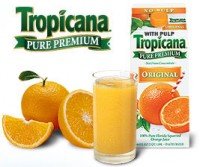Ban on Brazil OJ imports considered as US juice producers report traces of illegal pesticide
2 min read
WASHINGTON — Fears that the U.S. might ban imports of orange juice from Brazil drove orange juice futures to an all-time high on Tuesday as health regulators began testing all incoming shipments for traces of an illegal fungicide called carbendazim.
According to the Food and Drug Administration, a U.S. juice producer had detected low levels of carbendazim in orange juice concentrate imported from Brazil, the top grower accounting for more than 10 percent of the U.S. supply.
The pesticide is banned in U.S. citrus but it is used on orange trees in Brazil to fight mold. The FDA said low levels of carbendazim were not dangerous and the agency had no plans for a recall, but it would stop any shipments of orange juice at the border that tested positive for the fungicide.
Orange juice futures jumped almost 11 percent to an all-time high on the news, which was announced by the FDA in a letter to the Juice Products Association on Monday. The orange juice market is particularly prone to volatility because of its tiny size compared to oil and other major commodities.
It was not immediately clear whether there would be a related increase in orange juice prices for consumers, as that would depend on how long futures stay high and whether this results in a shortage of orange juice shipments into the United States.
Brands such as Tropicana, from PepsiCo Inc, and Minute Maid, from Coca-Cola Co, may use a mix of juices sourced from Brazil and the United States.
“Obviously food safety issues are probably going to play a bigger and bigger role in driving food or commodity prices in the future,” said Ray Royce, executive director of the Highlands County Citrus Growers Association in central Florida.
He said the spike in orange juice futures was a double-edged sword for Florida growers, even as higher prices generally translate into richer profits for them.
“There might be concerns in some consumers’ minds about there being chemicals within the juice. I think that could almost counter-balance the increase in futures prices and subsequent returns to Florida growers,” said Royce.
Source: http://www.msnbc.msn.com/id/45956908/ns/health-food_safety/?ocid=twitter#.Tw3Pl6U29Bk






